- Home
- John le Carré
The Honorable Schoolboy
The Honorable Schoolboy Read online
PRAISE FOR JOHN LE CARRÉ
“Le Carré is more than just a great storyteller—he captures the Zeitgeist itself.”
—Tom Wolfe
“He is one of the half-dozen best novelists now working in English.”
—Chicago Sun-Times
“A brilliant linguistic artist with a keen eye for the exotic and not-so-exotic locale, a crafty moralizer with an occasional bent for sentiment.”
—The Wall Street Journal
“No other contemporary novelist has more durably enjoyed the twin badges of being both well-read and well-regarded.”
—Scott Turow
“Le Carré has a great talent for entangling his audience in the sticky tape of complexity, paradox, and irony, and much of the pleasure in his stories is following the same dense, dark path as his characters.”
—New York Daily News
“For my money, le Carré is the equal of any novelist now writing in English.”
—Guardian (U.K.)
“Le Carré is one of the best novelists—of any kind—we have.”
—Vanity Fair
AND PRAISE FOR HIS BESTSELLING THRILLERS
THE CONSTANT GARDENER
“His best book since The Spy Who Came In from the Cold. . . . Amazingly seductive, pulling you in deeper all the time.”
—David Halberstam
“Brilliant. . . . No serious novelist can do more.”
—The Washington Post Book World
“Le Carré has never been angrier or more satisfyingly entertaining.”
—New York Daily News
“A novelist of conscience, pure and simple. . . . A masterpiece.”
—Seattle Union Record
SINGLE & SINGLE
“Any reader who feared that the end of the Cold War would deprive Mr. le Carré of his subject can now feel a measure of relief. If anything, his subject of East-West misunderstanding has grown richer, and he now possesses vast new territories to mine.”
—The New York Times
THE RUSSIA HOUSE
“An exciting spy story. . . . A well-informed political parable, incisive and instructive . . . rich . . . poignant . . . fascinating.”
—The New York Times Book Review
A PERFECT SPY
“Le Carré is a perfect spy novelist. A first-rate espionage novel, perhaps his best.”
—The New York Times
THE LITTLE DRUMMER GIRL
“It becomes instantly apparent that we are in the hands of a writer of great powers. . . . It transcends the genre. . . . His entertainment is of a high order.”
—The New York Times Book Review
SMILEY’S PEOPLE
“Riveting. Le Carré at the top of his powers.”
—Newsday
THE HONOURABLE SCHOOLBOY
“One of the most effective thrillers we have had in years.”
—The Sunday Times (U.K.)
THE NAÏVE AND SENTIMENTAL LOVER
“Splendid, original . . . le Carré shows how endowed he is with the gift of storytelling.”
—The Times (U.K.)
A SMALL TOWN IN GERMANY
“Exciting, compulsively readable, and brilliantly plotted.”
—The New York Times
THE SPY WHO CAME IN FROM THE COLD
“The best spy story I have ever read.”
—Graham Greene
PENGUIN CANADA
THE HONOURABLE SCHOOLBOY
JOHN LE CARRÉ is the author of many bestselling novels, several of which have achieved the status of modern classic. His works include The Spy Who Came in from the Cold; Tinker, Tailor, Soldier, Spy; Smiley’s People; The Russia House; The Constant Gardener; Absolute Friends; and The Mission Song.
ALSO BY JOHN LE CARRÉ
Call for the Dead
A Murder of Quality
The Spy Who Came in from the Cold
The Looking Glass War
A Small Town in Germany
The Naïve and Sentimental Lover
Tinker, Tailor, Soldier, Spy
Smiley’s People
The Little Drummer Girl
A Perfect Spy
The Russia House
The Secret Pilgrim
The Night Manager
Our Game
The Tailor of Panama
Single & Single
The Constant Gardener
Absolute Friends
The Mission Song
JOHN
LE CARRÉ
THE HONOURABLE
SCHOOLBOY
PENGUIN CANADA
Published by the Penguin Group
Penguin Group (Canada), 90 Eglinton Avenue East, Suite 700, Toronto, Ontario, Canada M4P 2Y3
(a division of Pearson Canada Inc.)
Penguin Group (USA) Inc., 375 Hudson Street, New York, New York 10014, U.S.A.
Penguin Books Ltd, 80 Strand, London WC2R 0RL, England
Penguin Ireland, 25 St Stephen’s Green, Dublin 2, Ireland (a division of Penguin Books Ltd)
Penguin Group (Australia), 250 Camberwell Road, Camberwell, Victoria 3124, Australia
(a division of Pearson Australia Group Pty Ltd)
Penguin Books India Pvt Ltd, 11 Community Centre, Panchsheel Park, New Delhi – 110 017, India Penguin Group (NZ), cnr Airborne and Rosedale Roads, Albany, Auckland 1310, New Zealand
(a division of Pearson New Zealand Ltd)
Penguin Books (South Africa) (Pty) Ltd, 24 Sturdee Avenue, Rosebank, Johannesburg 2196, South Africa
Penguin Books Ltd, Registered Offices: 80 Strand, London WC2R 0RL, England
First published in Great Britain by Hodder and Stoughton Ltd, 1977
Published in Penguin Canada paperback by Penguin Group (Canada),
a division of Pearson Canada Inc., 1989, 2001
Published in this edition, 2006
1 2 3 4 5 6 7 8 9 10 (WEB)
Copyright © David Cornwell, 1977
Introduction copyright © David Cornwell, 1989
Grateful acknowledgment is made to Random House, Inc., and to Faber & Faber Ltd. for permission to reprint four lines of “September 1, 1939” from The Collected Poetry of W. H. Auden by W. H. Auden. Copyright 1940 by W. H. Auden.
All rights reserved. Without limiting the rights under copyright reserved above, no part of this publication may be reproduced, stored in or introduced into a retrieval system, or transmitted in any form or by any means (electronic, mechanical, photocopying, recording or otherwise), without the prior written permission of both the copyright owner and the above publisher of this book.
Publisher’s note: This book is a work of fiction. Names, characters, places and incidents either are the product of the author’s imagination or are used fictitiously, and any resemblance to actual persons living or dead, events, or locales is entirely coincidental.
Manufactured in Canada.
* * *
LIBRARY AND ARCHIVES CANADA CATALOGUING IN PUBLICATION
Le Carré, John, 1931–
The honourable schoolboy / John le Carré.
ISBN-13: 978-0-14-305673-7
ISBN-10: 0-14-305673-5
I. Title.
PR6062.E42H65 2006 823’.914 C2006-902557-6
* * *
British Library Cataloguing in Publication data available
American Library of Congress Cataloging in Publication data available
Except in the United States of America, this book is sold subject to the condition that it shall not, by way of trade or otherwise, be lent, re-sold, hired out, or otherwise circulated without the publisher’s prior consent in any form of binding or cover other than that in which it is published and without a similar condition including this condition b
eing imposed on the subsequent purchaser.
Visit the Penguin Group (Canada) website at www.penguin.ca
Special and corporate bulk purchase rates available; please see www.penguin.ca/corporatesales or call 1-800-399-6858, ext. 477 or 474
For Jane, who bore the brunt,
put up with my presence and
absence alike, and made it all possible
I and the public know
What all schoolchildren learn,
Those to whom evil is done
Do evil in return.
—W. H. Auden
FOREWORD
I offer my warm thanks to the many generous and hospitable people who found time to help me with my research for this novel.
In Singapore, Alwyne (Bob) Taylor, the Daily Mail correspondent; Max Vanzi, of U.P.I.; Peter Simms, then of Time; and Bruce Wilson, of the Melbourne Herald.
In Hong Kong, Sydney Liu, of Newsweek; Bing Wong, of Time; H. D. S. Greenway, of the Washington Post; Anthony Lawrence, of the B.B.C.; Richard Hughes, then of the Sunday Times; Donald A. Davis and Vic Vanzi, of U.P.I.; and Derek Davies and his staff at the Far Eastern Economic Review, notably Leo Goodstadt. I must also acknowledge with gratitude the exceptional co-operation of Major General Penfold and his team at the Royal Hong Kong Jockey Club, who gave me the run of Happy Valley Racecourse and showed me much kindness without once seeking to know my purpose. I wish I could also name the several officials of the Hong Kong government, and members of the Royal Hong Kong Police, who opened doors for me at some risk of embarrassment to themselves.
In Phnom Penh, my genial host Baron Walther von Marschall took marvellous care of me, and I could never have managed without the wisdom of Kurt Furrer and Madame Yvette Pierpaoli, both of Suisindo Shipping & Trading Co., and currently in Bangkok.
But my special thanks must be reserved for those who put up with me the longest: for my friend David Greenway, of the Washington Post, who allowed me to follow in his distinguished shadow through Laos, North East Thailand, and Phnom Penh; and for Peter Simms, who, before settling in Hong Kong, guided my eye through unfamiliar territory and helped me with much of the legwork. To them, to Bing Wong, and to certain Hong Kong Chinese friends who, I believe, will prefer to remain anonymous, I owe a great debt.
Last there is the great Dick Hughes, whose outward character and mannerisms I have shamelessly exaggerated for the part of old Craw. Some people, once met, simply elbow their way into a novel and sit there till the writer finds them a place. Dick is one. I am sorry I could not obey his urgent exhortation to libel him to the hilt. My cruellest efforts could not prevail against the affectionate nature of the original.
And since none of these good people had any more notion than I did, in those days, of how the book would turn out, I must be quick to absolve them from my misdemeanours.
Terry Mayers, a veteran of the British Karate Team, advised me on certain alarming skills. And for Miss Nellie Adams, for her stupendous bouts of typing, no praise is enough.
JOHN LE CARRÉ
Cornwall, 1977
INTRODUCTION
A clever English writer once remarked that he wrote in order to have something to read in his old age. At fifty-seven I have yet to count myself old, but there is no doubt that in the thirteen years since I began this book, history has aged perceptibly. Thirteen years ago the Soviet Union was still locked in the ice of a slothful and corrupt oligarchy, and the puritanically minded leaders of the new China had turned their backs on their old ally and mentor in contempt. Today it is the Soviet Union which is in the throes of redefining the great Proletarian Revolution, if there ever really was one, while the blood of heroic young Chinese men and women who asked peaceably for similar redefinition of their political identity lies thick on Tiananmen Square, however many times the Army’s watercannons try to wash it away.
So if you read this book, be warned. You are reading an historical novel, written on the hoof, in a climate so altered that I for one would not know how to recapture any part of it if I were to try to tell you the same story in recollection today.
There is another reason why I might be tempted back to this book in my old age, and that is its fragile recognition of the man I was at the time. The Honourable Schoolboy was the first book I wrote on location, and the first, but not the last, for which I put on the non-uniform of a field reporter in order to obtain my experiences and my information. It commemorates the first time I saw shots exchanged in the heat of battle, or succoured a wounded soldier, or smelt the stench of old blood in the fields. It tells therefore of a certain growing up, but also of a certain growing down, for war is nothing if not a return to childhood.
Thus when Jerry Westerby, my hero, takes his taxi-ride to the battle front a few kilometres outside Phnom Penh, and involuntarily finds himself behind Khmer Rouge lines, I was sitting much where he sat, in the same taxi, with my heart in my mouth, drumming my fingers on the same dashboard and offering the same prayers to my Maker. When Jerry visits an opium den or entrusts himself to the flying skills of an intoxicated Chinese opium pilot in an aeroplane that would not have passed muster in a scrap - auction, he is the beneficiary of my own timid adventurings. Which means only that, in the space of a few months, I shared the perils that any good reporter will take in his stride in a single afternoon.
I remember only one occasion when I chickened, but it does duty for those other occasions I have conveniently forgotten. With H. D. S. Greenway, then of the Washignton Post, I was proposing to take a train from Nakhomphenom, in North-East Thailand, back to Bangkok. We had come from Laos and had been roughing it for a week. We had shared some rich but unnerving encounters in the insurgency area, not least with an American-trained Thai colonel of Special Forces whom you will meet in the later chapters of the book and who carried more armament on his person than anybody I have ever seen before or since. As we approached the ticket office, Greenway asked me wearily whether my quest for material required us to travel in the poorest part of the train. I was still hesitating when he came up with the solution: “Tell you what. We’ll travel First and leave Smiley to sweat it out in Third.” And so we did, and consequently arrived in Bangkok in good enough shape to celebrate the publication of Tinker, Tailor, Soldier, Spy.
Why else might I pick up this book ten years from now? The answer is like a sad smile in my memory. For the vanished Cambodia. For the vanished Phnom Penh, the last of Joseph Conrad’s river ports to go to the devil. For the scent of cooking oil and night flowers and the clamour of the bullfrogs as we ate our ridiculously wonderful French-Khmer meals just a few miles from the predatory armies that were about to devastate the city. For the insinuating murmur of the street girls perched up in the backs of their cyclos, as they ticked past us in the hot dark. For the memory, in short, of the dying days of French colonialism, before the vengeance of the terrible Pol Pot and his Khmer Rouge swept it all away for good or bad.
As to Hong Kong—is that all history too? Even as I write, Mrs. Thatcher’s Foreign Secretary is in the Colony, bravely explaining why Britain can do nothing for a people she has dined off for a hundred and fifty years. Only betrayal, it seems, is timeless.
JOHN LE CARRÉ
July 1989
PART I
Winding the Clock
1
HOW THE CIRCUS LEFT TOWN
Afterwards, in the dusty little corners where London’s secret servants drink together, there was argument about where the Dolphin case history should really begin. One crowd, led by a blimpish fellow in charge of microphone transcription, went so far as to claim that the fitting date was some sixty years ago, when “that arch-cad Bill Haydon” was born into the world under a treacherous star. Haydon’s very name struck a chill into them. It does so even today. For it was this same Haydon who, while still at Oxford, was recruited by Karla the Russian as a “mole” or “sleeper”—or, in English, agent of penetration—to work against them. And who with Karla’s guidance entered their ranks and spied on them for
thirty years or more. And whose eventual discovery—thus the line of reasoning—brought the British so low that they were forced into a fatal dependence upon their American sister service, whom they called in their own strange jargon “the Cousins.” The Cousins changed the game entirely, said the blimpish fellow, much as he might have deplored power tennis or bodyline bowling. And ruined it too, said his seconds.
To less-flowery minds, the true genesis was Haydon’s unmasking by George Smiley and Smiley’s consequent appointment as caretaker chief of the betrayed service, which occurred in the late November of 1973. Once George had got Karla under his skin, they said, there was no stopping him; the rest was inevitable. Poor old George: but what a mind under all that burden!
One scholarly soul, a researcher of some sort—in the jargon, a “burrower”—even insisted, in his cups, upon January 26, 1841, as the natural date, when a certain Captain Elliot of the Royal Navy took a landing party to a fog-laden rock called Hong Kong at the mouth of the Pearl River and a few days later proclaimed it a British colony. With Elliot’s arrival, said the scholar, Hong Kong became the headquarters of Britain’s opium trade to China, and in consequence one of the pillars of the Imperial economy. If the British had not invented the opium market—he said, not entirely serious—then there would have been no case, no ploy, no dividend; and therefore no renaissance of the Circus following Bill Haydon’s traitorous depredations.
Whereas the hard men—the grounded fieldmen, the trainers, and the case officers who made their own murmured caucus always—they saw the question solely in operational terms. They pointed to Smiley’s deft footwork in tracking down Karla’s paymaster in Vientiane; to Smiley’s handling of the girl’s parents; and to his wheeling and dealing with the reluctant barons of Whitehall, who held the operational purse strings and dealt out rights and permissions in the secret world. Above all, to the wonderful moment where he turned the operation round on its own axis. For these pros, the case was a victory of technique. Nothing more. They saw the shot-gun marriage with the Cousins as just another skilful bit of tradecraft in a long and delicate poker game. As to the final outcome: to hell. The king is dead, so long live the next one.

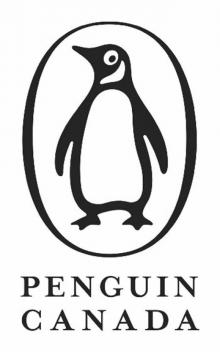 The Honorable Schoolboy
The Honorable Schoolboy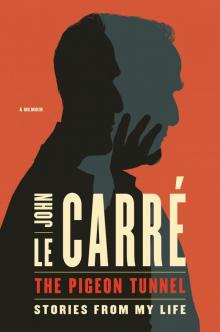 The Pigeon Tunnel: Stories From My Life
The Pigeon Tunnel: Stories From My Life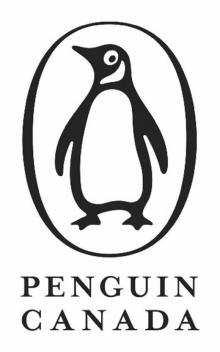 Single & Single
Single & Single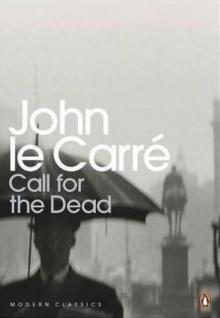 The Spy Who Came in From the Cold
The Spy Who Came in From the Cold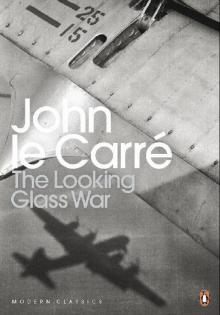 The Looking Glass War
The Looking Glass War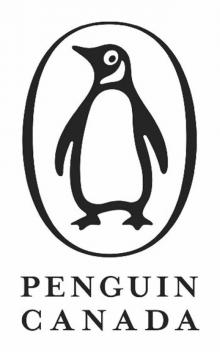 The Night Manager
The Night Manager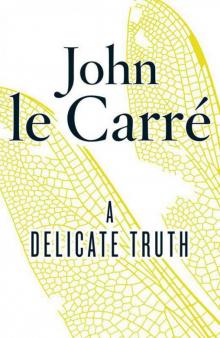 A Delicate Truth
A Delicate Truth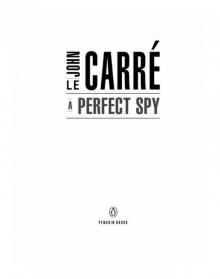 A Perfect Spy
A Perfect Spy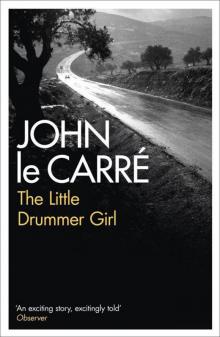 The Little Drummer Girl
The Little Drummer Girl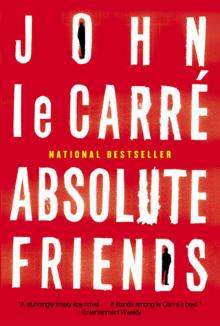 Absolute Friends
Absolute Friends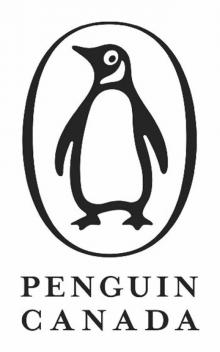 A Murder of Quality AND Call for the Dead
A Murder of Quality AND Call for the Dead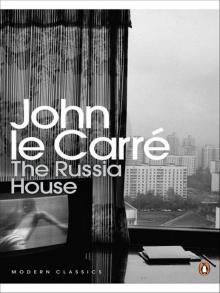 The Russia House
The Russia House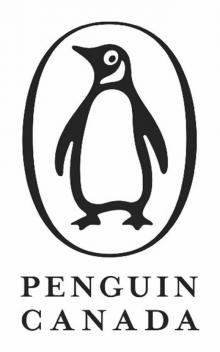 The Tailor of Panama
The Tailor of Panama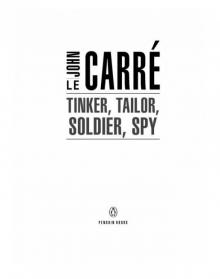 Tinker, Tailor, Soldier, Spy
Tinker, Tailor, Soldier, Spy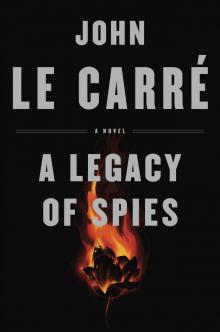 A Legacy of Spies
A Legacy of Spies The Mission Song
The Mission Song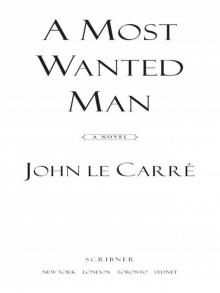 A Most Wanted Man
A Most Wanted Man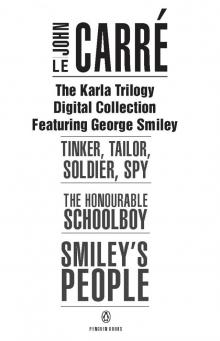 John Le Carré: Three Complete Novels
John Le Carré: Three Complete Novels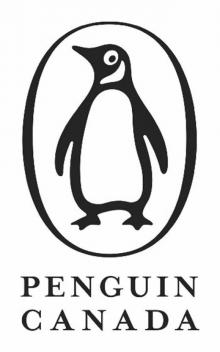 The Secret Pilgrim
The Secret Pilgrim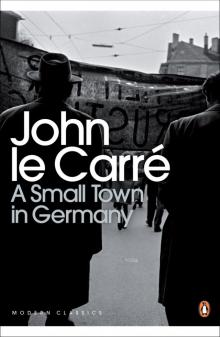 A Small Town in Germany
A Small Town in Germany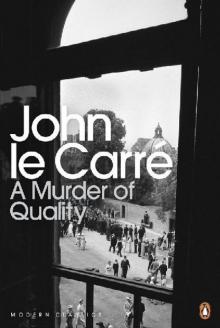 A Murder of Quality
A Murder of Quality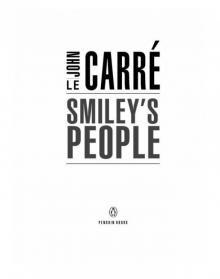 Smiley's People
Smiley's People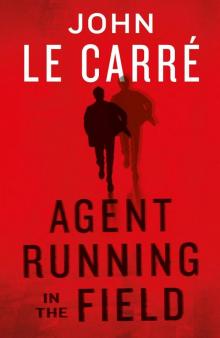 Agent Running in the Field
Agent Running in the Field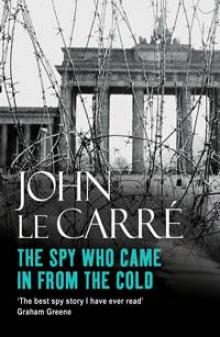 The Spy Who Came in from the Cold s-3
The Spy Who Came in from the Cold s-3 The Pigeon Tunnel
The Pigeon Tunnel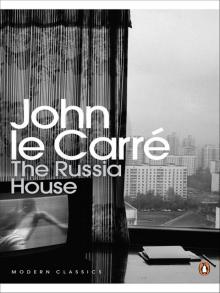 The Russia House - 13
The Russia House - 13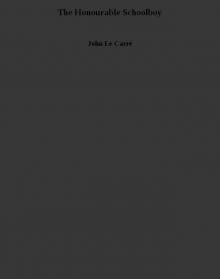 The Honourable Schoolboy
The Honourable Schoolboy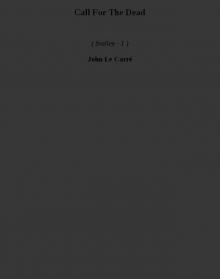 Call For The Dead s-1
Call For The Dead s-1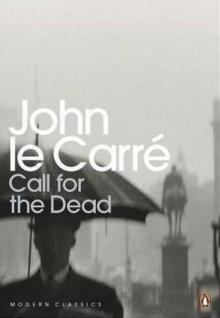 Call for the Dead
Call for the Dead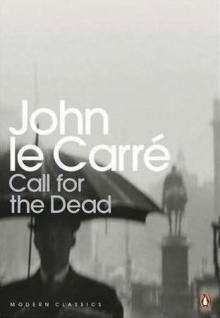 Call for the Dead - 1
Call for the Dead - 1